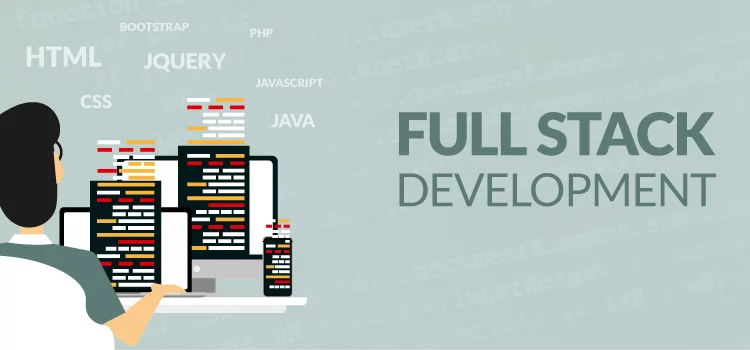A Full Stack Developer is the best person in the modern world to represent the phrase “versatile” in terms of professional versatility. Full Stack Developers are the multi-skilled experts that every business and brand seeks, as they are knowledgeable in both frontend and backend web development.
Since the beginning of the digital era, an increasing number of businesses and organisations have used their websites to establish a distinct online presence. Naturally, the field of web development is expanding at an unprecedented rate, resulting in an increase in demand for skilled Full Stack Developers.
What is full stack web development?
Full stack web development is a technique for addressing both the front end and back end of two distinct web development domains. Let’s define a full-stack developer first in order to better understand how to become one.
Who Is A Full Stack Developer?
An engineer who works on both the client and server sides of a software programme is know as a full-stack developer. Full-stack developers build new systems while incorporating user feedback into the overall design. A full-stack developer is not requir to be an expert in every technology. A specialist, on the other hand, is expect to work on both the client and server sides of the application and to understand how applications are built.
If you want to become a full stack developer, then do a full stack development course in Surat, as Simba Institute in Surat prepares you for success in the IT field.
What Does a Full Stack Developer Do?
The following tasks could be perform by a full-stack developer:
Incorporate user requirements into new system design and implementation. Coordinate with the client while managing the project.
Ruby, Python, Java, or PHP should be use to write backend code. Front-end HTML and JavaScript code is writte.
Recognize, write, and debug queries related to databases. Create test code to validate the programme against client specifications.
Keep an eye on the infrastructure and web apps’ performance.
Troubleshooting web applications in a timely and precise manner.
Important Skills Needed for Full Stack Developer
- Decide on your front-end development stack.
A front-end developer stack is one of the essential skills of a full-stack developer. The front end is responsible for the website’s aesthetic appearance and feel, whereas the back end is responsible for the site’s architecture and logic in the background. The client can gain access to a website’s front end and use it to communicate with the programme that creates the front end. Full-stack developers frequently use HTML, CSS, JavaScript, and other technologies for front-end development. You must first learn HTML, CSS, JavaScript, and Bootstrap to fully understand front-end programming.
Git: It is a well-known version control tool for collaborating with other developers and tracking code changes. To make necessary changes to the codebase, full-stack developers must be familiar with Git.
Design fundamentals:To be successful, full-stack developers must be familiar with UI/UX design and basic prototype design.
- Improve your Front-End Development Capabilities
One of the most important skills for full-stack developers to master is coding. You will advance faster in front-end development if you learn to code on your own. Begin with small projects and work your way up to bigger ones as your confidence grows. Furthermore, we recommend that you visit well-know Git repositories to see how the code is organised or what interesting libraries and tools are used. Consider starting with a simple grunt plugin and working your way up to minifying your JS. By visiting well-known websites that primarily use HTML and CSS, you can also read through any source code.
- Select a Back End Developer Stack
Because they work on both the front-end and the back-end, full-stack developers must be proficient in both technical capabilities and front-end programming languages. Programming languages, libraries, architectures, servers, data set management frameworks, and other tools make up the majority of back-end tech stacks.
- Improve your Back End Development Capabilities
One of the full-stack development skills required is back-end development. You should practise coding in a programming language such as Java, PHP, Python, or Ruby, depending on the role you’re applying for. Backend developers write programmes that allow databases and applications to exchange data. The more you code, the better you’ll become as a back-end developer. You can practise with free online resources.
- Necessary Database knowledge
A full-stack developer is in charge of writing the code necessary for relational mapping, which is use to retrieve data from a database. MySQL, SQL SERVER and PostgreSQL, MongoDB, and Oracle Database are examples of popular DBMSs. A full-stack developer must be familiar with databases. It is critical to fully understand how they work.
- Necessary Hosting/Server Skills
also, Using web hosting platforms, you can publish your product to a cloud service provider for online access. A full-stack developer must be knowledgeable about servers and hosting. Examples include Microsoft Azure, Google Cloud Platform, and Amazon Web Services. As a result, a developer should be knowledgeable about web hosting.
- Decide which Full Stack Developer Frameworks to use
Let’s move on to frameworks now that you’re familiar with the majority of the skills requir to be a full-stack developer. also, Frameworks are use by full-stack developers to create, improve, and maintain websites and other web-based applications. If you want to be a full-stack web developer, you should learn everything you can about web development technologies. You should be acquaint with the major frameworks, such as Angular, Django, Ruby, and Node.
- Develop Project Management Capabilities
The developer must meet deadlines while also ensuring that jobs are complet correctly. A full-stack developer must be able to manage projects. Project management is requir at every stage of the development life cycle. The developer can more efficiently plan the design, development, and implementation phases.
Conclusion
Businesses are looking for people who can leverage the abundance of new resources more than ever before. Because of today’s fast-paced, ever-changing world, developers must be able to handle both front-end and back-end programming.
more : dailymagazinenews.com
